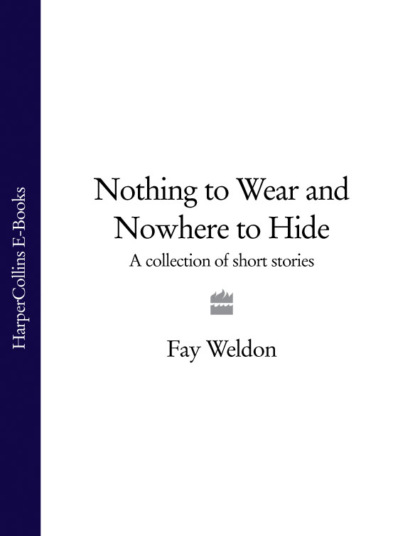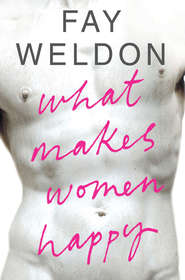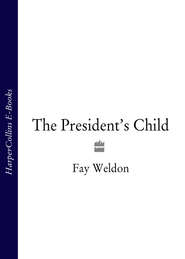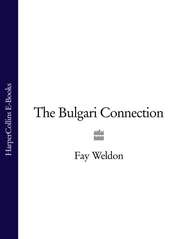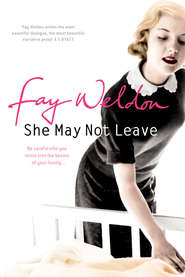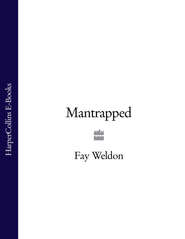По всем вопросам обращайтесь на: info@litportal.ru
(©) 2003-2024.
✖
Nothing to Wear and Nowhere to Hide: A Collection of Short Stories
Настройки чтения
Размер шрифта
Высота строк
Поля
Nothing to Wear and Nowhere to Hide: A Collection of Short Stories
Fay Weldon
A wonderful collection on topical themes from the controversial ‘product-placement’ author of The Bulgari Connection.A superb new collection of stories: shrewd, sharp, insightful, with a cheerfully dark view of the world.The wronged wife remains a lingering presence even after the mistress has moved in to her home. Oriole, an enormously successful businesswoman married to the ineffectual Hugh, begins to re-evaluate her life, when her best crockery keeps mysteriously flying through the air. A sculptor finds love while protecting a Roman graveyard from property developers. A Christmas gathering turns murderous for one unhappy guest. A travel writer watches, horrified, as her father runs of with her best friend, but is soon planning revenge.The entire collection is shot through with Weldon's trademark mischievous deceitfulness, her hidden meanings and agendas. Rich, mad, greedy, deceitful, vulnerable her characters may be, but the stories maintain a defiantly optimistic air and sparkle with the irrepressible wit with which Weldon writes about the lives of modern men and women.
Nothing to Wear and Nowhere to Hide
Fay Weldon
Stories
Table of Contents
Cover Page (#u3ea9f3d1-dbf8-5ba6-9bb2-8221e4b3330f)
Title Page (#u545a6470-98cc-5e87-a0a4-93e9178edd71)
THINGS THAT GO BUMP IN THE NIGHT (#ue73d8701-ae00-51a0-b29c-01813c682f46)
Eyes in the Dark (#udb581b9a-4b24-59e0-b6d7-9e3cd7b822c4)
A Knife for Cutting Mangoes (#ua9dcf9ed-dd84-5948-bf3f-00ce502ae9a4)
The Medium is the Message (#u3046932c-c174-5a19-b1ec-623daae857c0)
The Site (#uc0116c16-6ea0-5081-b901-304f3f004d59)
THE DEVIOUS AND DELECTABLE (#u1045b493-fe48-5434-8094-d2ed78ca238d)
A Summer Person (#u445ad2b3-99e2-53a5-a411-119472c25daf)
What the Papers Say (#litres_trial_promo)
Smoking Chimneys (#litres_trial_promo)
Percentage Trust (#litres_trial_promo)
MAKING DO (#litres_trial_promo)
How Donna Came to Win the Lottery (#litres_trial_promo)
Trophy Wife (#litres_trial_promo)
Live Like a Dog, Alone (#litres_trial_promo)
Well, I Said (#litres_trial_promo)
MAKING GOOD (#litres_trial_promo)
Freeze Eggs, Freeze Eggs! (#litres_trial_promo)
Cold, Wet Nose (#litres_trial_promo)
Wild Strawberries (#litres_trial_promo)
I, Boadicea (#litres_trial_promo)
HOW WE LIVE NOW (#litres_trial_promo)
Nothing to Wear (#litres_trial_promo)
Heaven Knows (#litres_trial_promo)
Living by the Small Print (#litres_trial_promo)
Queen Gertrude plc A radio play (#litres_trial_promo)
Also by Fay Weldon (#litres_trial_promo)
Copyright (#litres_trial_promo)
About the Publisher (#litres_trial_promo)
THINGS THAT GO BUMP IN THE NIGHT (#ulink_cf969b8d-454d-5648-8aa8-2ddb7cc1c597)
Eyes in the Dark (#ulink_3ad40bc4-41f3-561c-aeee-193874a12941)
Cats have souls. You know they do, because of the way they haunt houses. For a time after a cat dies you see movements out of the corner of your eye. A flash of a tail disappearing round the door, a kind of shifting blur under the table where it used to eat, yet when it was alive you got the feeling it didn’t really care for you one bit, it wouldn’t acknowledge you at all. I’ve known cats hang around the living for years, and a canary once – but that’s another story. Dogs don’t normally haunt: when they’re dead they lie down: their graves are quiet. They’re such bundles of emotion in life, they’ve none left over in death. The effort of communicating without words for a lifetime has altogether exhausted their spirit. Enough of that, they tend to say, that’s enough, I’ve failed, I’m off, sorry and all that but goodbye. Finish.
This is the story of Galway, our yellow Labrador, who did stay around. I don’t know if he exactly had a soul or not, but his spirit certainly outran his death. He was a sturdy, grave animal, affectionate but somehow distant, slightly disdainful, as if Olive the cat had had rather too much influence on his growing years. Olive, golden-eyed and silky black, would box his ears when he was a puppy and misbehaving, a quick one-two with either paw, and then Galway would remember his canine nature and chase her up the apple tree outside the back door, and she would sit there and sneer down at him, and he would sit and gaze up at her with doleful, rather envious eyes, as if he wanted to be like that, to be able to impose swift and just retribution, and then leap up a branch and be superior. We lived in the country then, on a smallholding: those were the good days.
In the winters Olive would sleep leaning up against Galway in his basket in the utility room and once in the morning I found my two-year-old in there as well, all three lying in a warm sleeping breathing heap, Galway, Olive and Mark. I was too exhausted to worry about parasites, or fleas, I was just grateful for a happy, sleeping child. His younger twin sisters were only six months old: if the animals would give a hand so much the better.
We had four Soay sheep in the field; what gluttons for punishment we were. Soays are a rare breed, accustomed to hardship: they have long stringy legs, they startle like deer, for which they are sometimes mistaken. Their natural habitat is the rocky Scottish coastline, their proper diet is seaweed and scrub. We gave our small flock, or herd, three ewes and one ram, lush southern grass to graze, and they took it in their stride. The ewes stopped being all rib and scrag, and turned quite plump and rounded and velvet-coated, if never tranquil, and the ram’s horns grew strong, curved and proud; he learned to stamp his foot. They had an acre field to themselves, with a gate that led from our vegetable garden, and even a high point to stand on, in place of a cliff, for all it was only a grassy hump: an old burial mound, it was said. But they were always nervous of us, though we were their benefactors. We’d take them out their sheep nuts and fill their trough with water every morning and they’d dart away and stand at a distance, on their mound, staring, ready to bolt. The ram would place himself in front of his two wives and his old mother, and lower his curly horns and do a bit of stamping. But as with so many animals, they went through their rituals of flight, defence, attack, more for form’s sake than out of any urgency. I never thought they took us really seriously.
And when one night unexpectedly the youngest ewe gave birth to twin lambs they were there waiting for us in the morning, the four of them, proud and pleased to show us what they’d done, waiting for our acknowledgement, our oohs and aahs, before affecting to be terrified and leaping off to their mound to view us askance, the two curious, skinny-legged lambs, born ready for flight, tottering up the slope, legs tangling, following after.
The sheep fascinated Galway: he’d wriggle under the gate and lie just the other side of it watching them, while they ignored him—rather insultingly, I thought—grazing right up to inches from his nose, in sheer defiance of his canine nature, which was, quite honestly, to chase them from here to kingdom come. You could see his ears twitching from the effort of not.
One day when I was putting the washing on the line, Mark—he must have been just over two at the time, let himself out through the gate and sat cross-legged and peaceful next to Galway, sheep watching. Olive, black and sinewy, stalked through patches of nettles—they never ate nettles—to join them.
It was the first day of spring after a long hard winter; the sky was washed and beautiful: you know that line in the psalms when it says, ‘And all the valleys shall be exalted,’ and you wonder what it means? One of those mornings. Our robin sat on the clothesline and said, ‘Well, spring’s here at last!’ or would have, I was sure, if he only had the power of speech. As it was, he just looked at me, head on one side, eyes glittering, for a full four beats longer than usual before flying off to the apple tree.
And I stood where I was, amazed. Because one of the lambs, dazzled perhaps by the sudden glittery sunshine, and all normal wintry rules of engagement deferred, had joined Galway, Olive and Mark. Sheep, dog, cat and child sat in a circle and stared at one another, and from one to the other, for all the world as if they were trying to decide who they were, what they were, which was the one they were like. The twins started crying in the house and I moved suddenly and the spell was broken, and they dispersed, but I think from that day on Galway decided he was a sheep; certainly after that he was for ever trying to be one of their number. The sheep didn’t want that, and when he ran up to join them ran off in the opposite direction in apparent distress and panic, and Galway would run after. A process known by the local farmers as ‘running the profit off ’em’. So it became our function to try and keep Galway out of the field while he tried to get in. Animals can be a terrible nuisance.
Oh, they were mischievous, those Soays, those dancing, prancing, nervy sheep from the Outer Hebrides. Once a year we had to round them up and take them to the livestock centre to be dipped against scabies. We humans would start from the corners of the field, and move in upon them from every angle, and Galway was allowed in because clearly he had the heart of a sheepdog in the body of a Labrador; he’d race round, knowing instinctively what to do, driving back any who ran for cover, and Mark at three joined in and waved his little arms in the air in the right place at the right moment, and between us we managed it. It was one of those days you don’t forget, such a mixture of joy and dreadfulness. My husband fell and drove a stick into his knee and simply pulled it out and carried on. On a normal day it would have meant doctors and stitches and tetanus jabs, and all that other human ritual to do with survival.
And then that autumn when Mark turned five, Galway was run over and killed. They’d built a new bypass at the end of the lane and he was sensible enough in many ways but his life experience had not included a six-lane highway, and we had failed to protect him. The grown-ups cried, the twins howled; Mark went and lay in Galway’s basket and I had to drag him out. Later, while he wailed, I swore never, never to have another animal. It was unendurable. The robin had gone, too. Some bird of prey, no doubt, or even Olive, I wouldn’t put it past her. She was upset too: she marked Galway’s absence by sitting in the apple tree long after dusk, waiting. Mark had screaming fits in the reception class at school; they sent him home for a psychologist’s report. He wouldn’t let me out of his sight, or only at dusk, when he’d go out on his own to feed the sheep.
A week after Galway’s death he came back smiling and said, ‘Galway’s in the field with the sheep.’ ‘That can’t be so,’ I said.
Fay Weldon
A wonderful collection on topical themes from the controversial ‘product-placement’ author of The Bulgari Connection.A superb new collection of stories: shrewd, sharp, insightful, with a cheerfully dark view of the world.The wronged wife remains a lingering presence even after the mistress has moved in to her home. Oriole, an enormously successful businesswoman married to the ineffectual Hugh, begins to re-evaluate her life, when her best crockery keeps mysteriously flying through the air. A sculptor finds love while protecting a Roman graveyard from property developers. A Christmas gathering turns murderous for one unhappy guest. A travel writer watches, horrified, as her father runs of with her best friend, but is soon planning revenge.The entire collection is shot through with Weldon's trademark mischievous deceitfulness, her hidden meanings and agendas. Rich, mad, greedy, deceitful, vulnerable her characters may be, but the stories maintain a defiantly optimistic air and sparkle with the irrepressible wit with which Weldon writes about the lives of modern men and women.
Nothing to Wear and Nowhere to Hide
Fay Weldon
Stories
Table of Contents
Cover Page (#u3ea9f3d1-dbf8-5ba6-9bb2-8221e4b3330f)
Title Page (#u545a6470-98cc-5e87-a0a4-93e9178edd71)
THINGS THAT GO BUMP IN THE NIGHT (#ue73d8701-ae00-51a0-b29c-01813c682f46)
Eyes in the Dark (#udb581b9a-4b24-59e0-b6d7-9e3cd7b822c4)
A Knife for Cutting Mangoes (#ua9dcf9ed-dd84-5948-bf3f-00ce502ae9a4)
The Medium is the Message (#u3046932c-c174-5a19-b1ec-623daae857c0)
The Site (#uc0116c16-6ea0-5081-b901-304f3f004d59)
THE DEVIOUS AND DELECTABLE (#u1045b493-fe48-5434-8094-d2ed78ca238d)
A Summer Person (#u445ad2b3-99e2-53a5-a411-119472c25daf)
What the Papers Say (#litres_trial_promo)
Smoking Chimneys (#litres_trial_promo)
Percentage Trust (#litres_trial_promo)
MAKING DO (#litres_trial_promo)
How Donna Came to Win the Lottery (#litres_trial_promo)
Trophy Wife (#litres_trial_promo)
Live Like a Dog, Alone (#litres_trial_promo)
Well, I Said (#litres_trial_promo)
MAKING GOOD (#litres_trial_promo)
Freeze Eggs, Freeze Eggs! (#litres_trial_promo)
Cold, Wet Nose (#litres_trial_promo)
Wild Strawberries (#litres_trial_promo)
I, Boadicea (#litres_trial_promo)
HOW WE LIVE NOW (#litres_trial_promo)
Nothing to Wear (#litres_trial_promo)
Heaven Knows (#litres_trial_promo)
Living by the Small Print (#litres_trial_promo)
Queen Gertrude plc A radio play (#litres_trial_promo)
Also by Fay Weldon (#litres_trial_promo)
Copyright (#litres_trial_promo)
About the Publisher (#litres_trial_promo)
THINGS THAT GO BUMP IN THE NIGHT (#ulink_cf969b8d-454d-5648-8aa8-2ddb7cc1c597)
Eyes in the Dark (#ulink_3ad40bc4-41f3-561c-aeee-193874a12941)
Cats have souls. You know they do, because of the way they haunt houses. For a time after a cat dies you see movements out of the corner of your eye. A flash of a tail disappearing round the door, a kind of shifting blur under the table where it used to eat, yet when it was alive you got the feeling it didn’t really care for you one bit, it wouldn’t acknowledge you at all. I’ve known cats hang around the living for years, and a canary once – but that’s another story. Dogs don’t normally haunt: when they’re dead they lie down: their graves are quiet. They’re such bundles of emotion in life, they’ve none left over in death. The effort of communicating without words for a lifetime has altogether exhausted their spirit. Enough of that, they tend to say, that’s enough, I’ve failed, I’m off, sorry and all that but goodbye. Finish.
This is the story of Galway, our yellow Labrador, who did stay around. I don’t know if he exactly had a soul or not, but his spirit certainly outran his death. He was a sturdy, grave animal, affectionate but somehow distant, slightly disdainful, as if Olive the cat had had rather too much influence on his growing years. Olive, golden-eyed and silky black, would box his ears when he was a puppy and misbehaving, a quick one-two with either paw, and then Galway would remember his canine nature and chase her up the apple tree outside the back door, and she would sit there and sneer down at him, and he would sit and gaze up at her with doleful, rather envious eyes, as if he wanted to be like that, to be able to impose swift and just retribution, and then leap up a branch and be superior. We lived in the country then, on a smallholding: those were the good days.
In the winters Olive would sleep leaning up against Galway in his basket in the utility room and once in the morning I found my two-year-old in there as well, all three lying in a warm sleeping breathing heap, Galway, Olive and Mark. I was too exhausted to worry about parasites, or fleas, I was just grateful for a happy, sleeping child. His younger twin sisters were only six months old: if the animals would give a hand so much the better.
We had four Soay sheep in the field; what gluttons for punishment we were. Soays are a rare breed, accustomed to hardship: they have long stringy legs, they startle like deer, for which they are sometimes mistaken. Their natural habitat is the rocky Scottish coastline, their proper diet is seaweed and scrub. We gave our small flock, or herd, three ewes and one ram, lush southern grass to graze, and they took it in their stride. The ewes stopped being all rib and scrag, and turned quite plump and rounded and velvet-coated, if never tranquil, and the ram’s horns grew strong, curved and proud; he learned to stamp his foot. They had an acre field to themselves, with a gate that led from our vegetable garden, and even a high point to stand on, in place of a cliff, for all it was only a grassy hump: an old burial mound, it was said. But they were always nervous of us, though we were their benefactors. We’d take them out their sheep nuts and fill their trough with water every morning and they’d dart away and stand at a distance, on their mound, staring, ready to bolt. The ram would place himself in front of his two wives and his old mother, and lower his curly horns and do a bit of stamping. But as with so many animals, they went through their rituals of flight, defence, attack, more for form’s sake than out of any urgency. I never thought they took us really seriously.
And when one night unexpectedly the youngest ewe gave birth to twin lambs they were there waiting for us in the morning, the four of them, proud and pleased to show us what they’d done, waiting for our acknowledgement, our oohs and aahs, before affecting to be terrified and leaping off to their mound to view us askance, the two curious, skinny-legged lambs, born ready for flight, tottering up the slope, legs tangling, following after.
The sheep fascinated Galway: he’d wriggle under the gate and lie just the other side of it watching them, while they ignored him—rather insultingly, I thought—grazing right up to inches from his nose, in sheer defiance of his canine nature, which was, quite honestly, to chase them from here to kingdom come. You could see his ears twitching from the effort of not.
One day when I was putting the washing on the line, Mark—he must have been just over two at the time, let himself out through the gate and sat cross-legged and peaceful next to Galway, sheep watching. Olive, black and sinewy, stalked through patches of nettles—they never ate nettles—to join them.
It was the first day of spring after a long hard winter; the sky was washed and beautiful: you know that line in the psalms when it says, ‘And all the valleys shall be exalted,’ and you wonder what it means? One of those mornings. Our robin sat on the clothesline and said, ‘Well, spring’s here at last!’ or would have, I was sure, if he only had the power of speech. As it was, he just looked at me, head on one side, eyes glittering, for a full four beats longer than usual before flying off to the apple tree.
And I stood where I was, amazed. Because one of the lambs, dazzled perhaps by the sudden glittery sunshine, and all normal wintry rules of engagement deferred, had joined Galway, Olive and Mark. Sheep, dog, cat and child sat in a circle and stared at one another, and from one to the other, for all the world as if they were trying to decide who they were, what they were, which was the one they were like. The twins started crying in the house and I moved suddenly and the spell was broken, and they dispersed, but I think from that day on Galway decided he was a sheep; certainly after that he was for ever trying to be one of their number. The sheep didn’t want that, and when he ran up to join them ran off in the opposite direction in apparent distress and panic, and Galway would run after. A process known by the local farmers as ‘running the profit off ’em’. So it became our function to try and keep Galway out of the field while he tried to get in. Animals can be a terrible nuisance.
Oh, they were mischievous, those Soays, those dancing, prancing, nervy sheep from the Outer Hebrides. Once a year we had to round them up and take them to the livestock centre to be dipped against scabies. We humans would start from the corners of the field, and move in upon them from every angle, and Galway was allowed in because clearly he had the heart of a sheepdog in the body of a Labrador; he’d race round, knowing instinctively what to do, driving back any who ran for cover, and Mark at three joined in and waved his little arms in the air in the right place at the right moment, and between us we managed it. It was one of those days you don’t forget, such a mixture of joy and dreadfulness. My husband fell and drove a stick into his knee and simply pulled it out and carried on. On a normal day it would have meant doctors and stitches and tetanus jabs, and all that other human ritual to do with survival.
And then that autumn when Mark turned five, Galway was run over and killed. They’d built a new bypass at the end of the lane and he was sensible enough in many ways but his life experience had not included a six-lane highway, and we had failed to protect him. The grown-ups cried, the twins howled; Mark went and lay in Galway’s basket and I had to drag him out. Later, while he wailed, I swore never, never to have another animal. It was unendurable. The robin had gone, too. Some bird of prey, no doubt, or even Olive, I wouldn’t put it past her. She was upset too: she marked Galway’s absence by sitting in the apple tree long after dusk, waiting. Mark had screaming fits in the reception class at school; they sent him home for a psychologist’s report. He wouldn’t let me out of his sight, or only at dusk, when he’d go out on his own to feed the sheep.
A week after Galway’s death he came back smiling and said, ‘Galway’s in the field with the sheep.’ ‘That can’t be so,’ I said.





